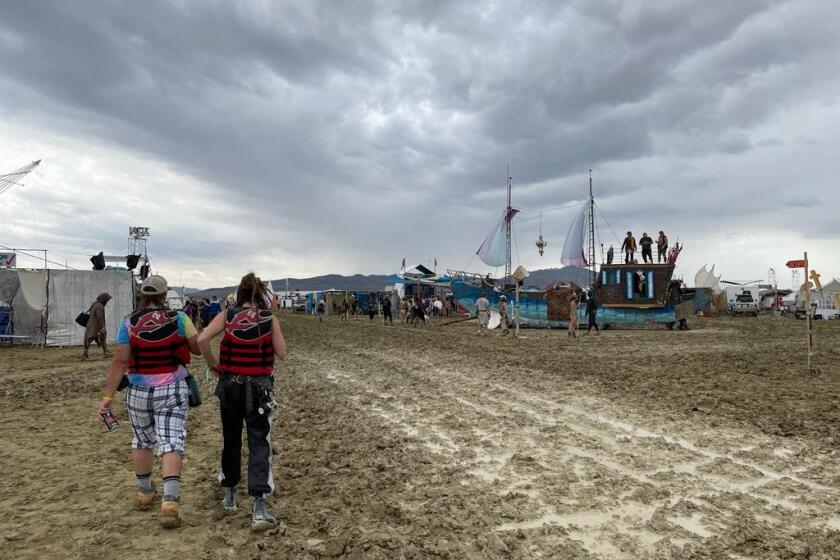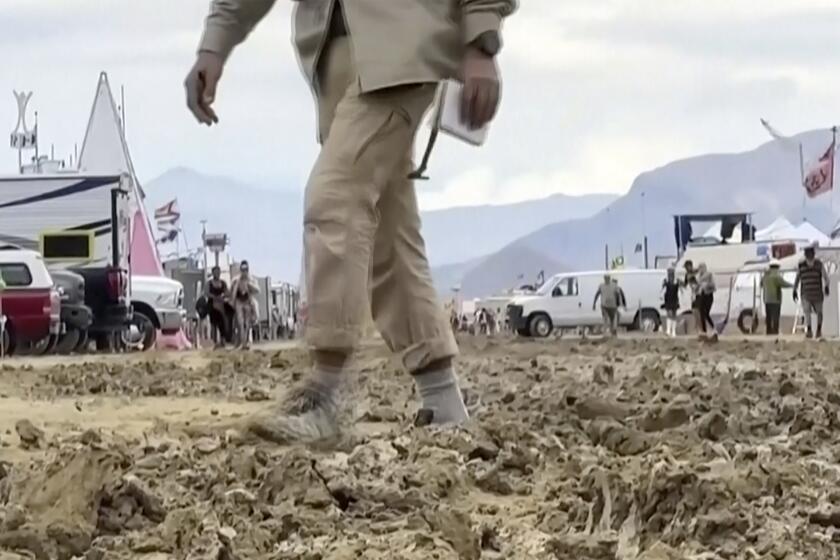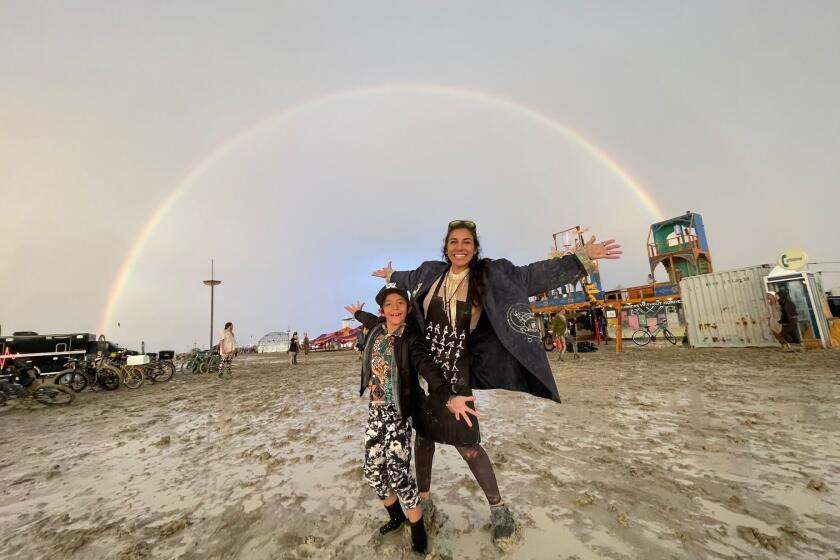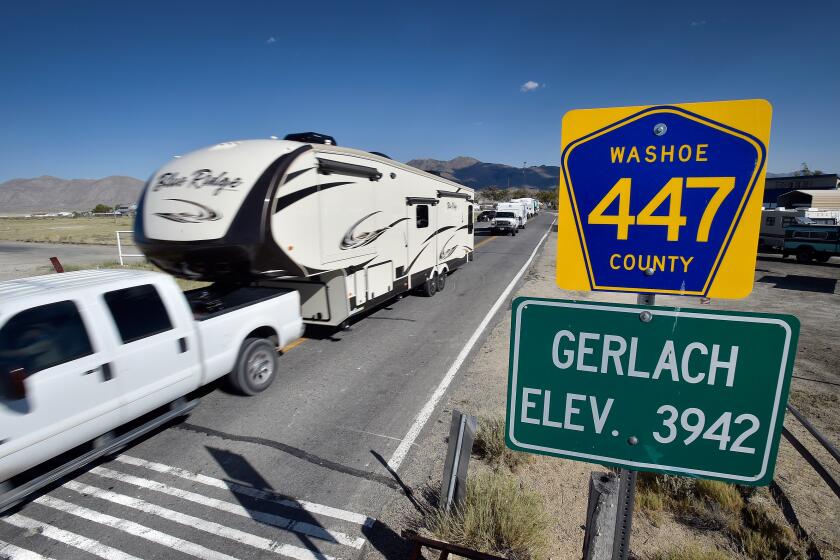Muddy misery at Burning Man? Not quite, campers say: The party went on
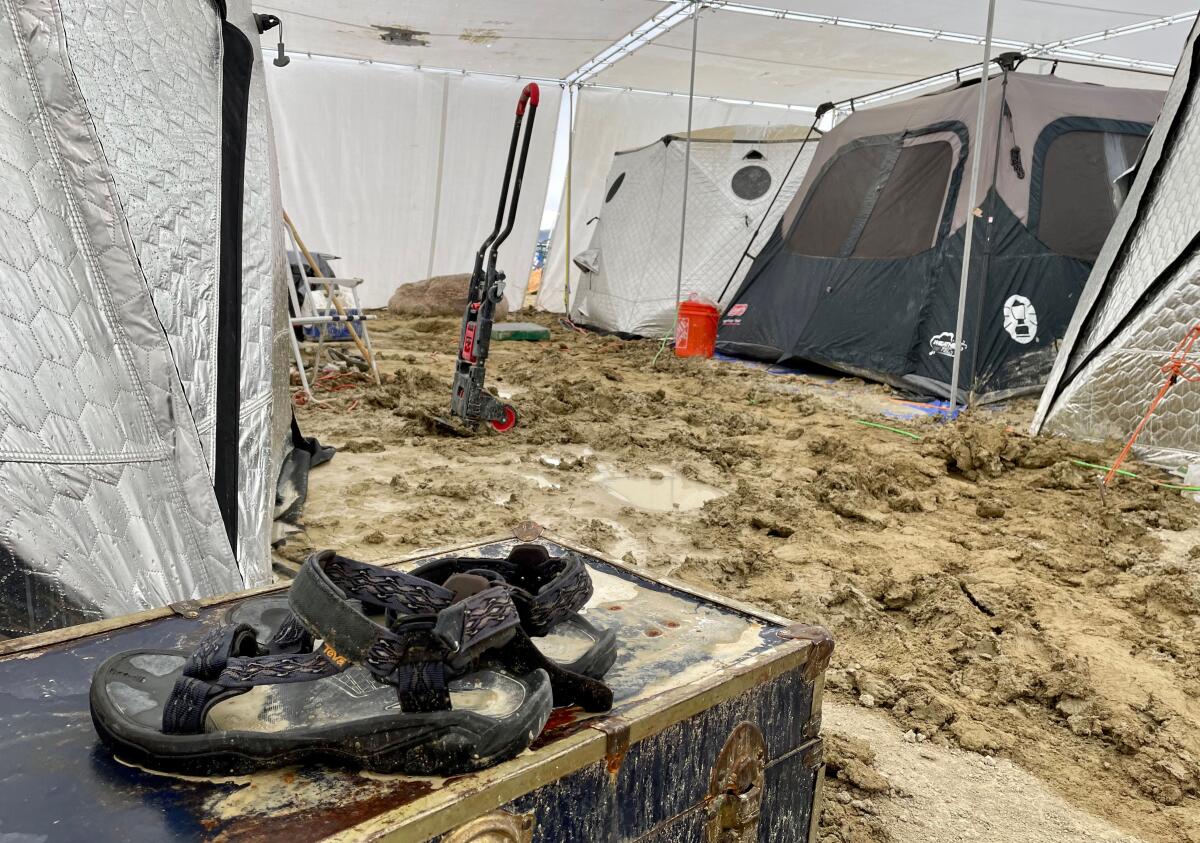
- Share via
As Michael Conti packed up and left his 25-person Burning Man camp Tuesday morning, he wondered what the outside world thought of what had happened at the remote festival in recent days after rainfall turned the ancient lakebed into sticky sludge.
The rain — a couple of months’ worth for the northwestern Nevada desert, according to one National Weather Service meteorologist — led festival organizers to close the gates in and out of Black Rock City, the makeshift metropolis that springs up for a week every year. “Burners” were instructed to shelter in place and conserve food, water and fuel, spurring stories of stranded revelers, celebrity escapes and rampant social media rumors.
“The headlines got it all wrong,” said Conti, 39. “It was a beautiful experience of everybody coming together in the face of serious danger and adversity.”
On Monday afternoon, the driving ban was lifted and tens of thousands of Burners began their slow, muddy exodus from Black Rock City, a process that can take several hours even under normal conditions.
People at the Burning Man festival in Nevada were told to conserve food, water and fuel and to shelter in place after rain turned the desert to mud. More rain is on the way.
Conti departed camp around 3 a.m. Tuesday and said it took nearly three hours to travel the five or so miles to the nearest paved road, heading toward Gerlach, Nev. The trek was “pretty decent” compared with last year, he said, when he spent nine hours in traffic.
Some attendees said it took six to seven hours to reach paved roads Monday.
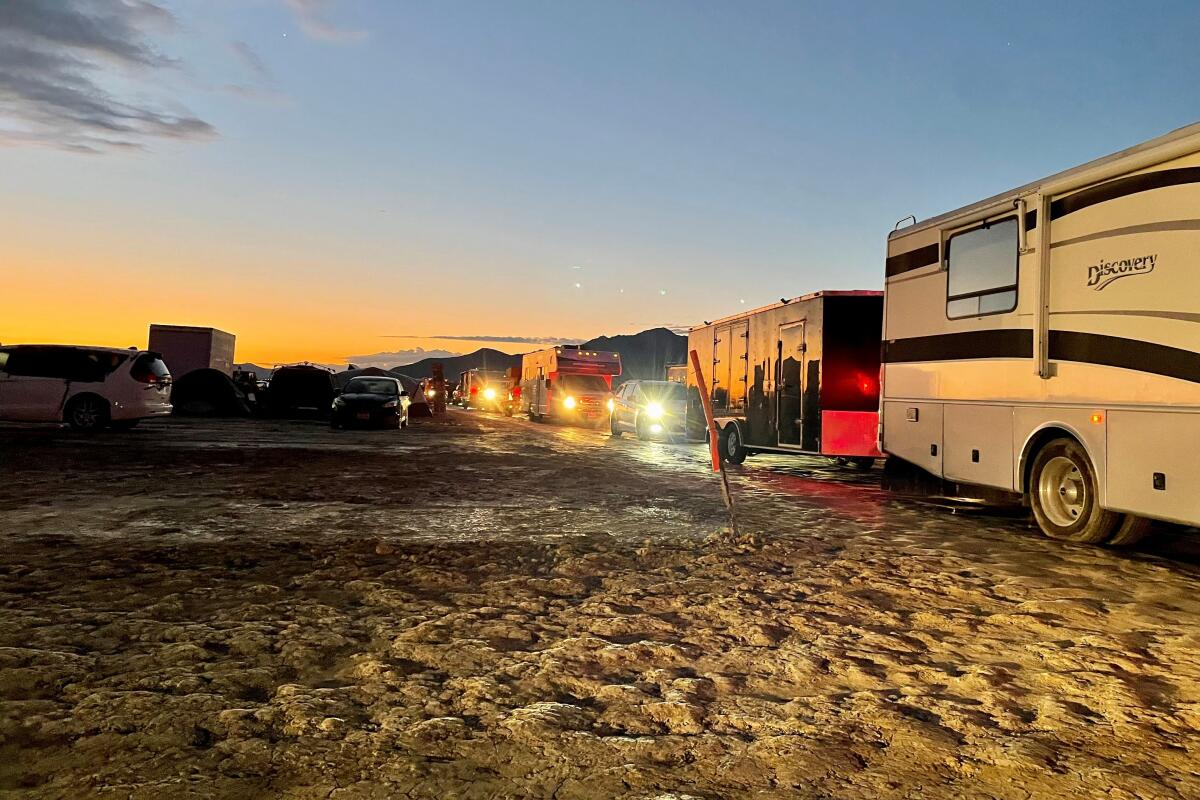
Conti’s wife, who is 23 weeks pregnant, made it out of the festival Monday and flew out of the Reno airport back home to Salt Lake City, he said.
Mark Stern, leader of a camp in the Friendly Society village led by Conti, said the Burning Man organization delivered no warning of a major weather event on its way, only reports of some rain early Friday morning. But then the rain came and didn’t stop, he said.
“The hardest thing about the whole experience was not knowing that it was going to happen or what is going to happen next,” said Stern, 60, who has been going to Burning Man since 2016.
His camp lost power and, he estimated, about 30% of its supplies. Stern left Sunday with some others from his camp who had a vehicle with four-wheel drive. They saw “dozens of cars” and RVs stuck in the mud on the way out, he said.
Burning Man exodus begins as festival-goers share their stories of escape.
As Black Rock City was winding down, authorities on Monday identified a 32-year-old man named Leon Reece who died at the festival.
According to the Reno Gazette Journal, Pershing County Sheriff Jerry Allen said dispatchers received a call at 6:24 p.m. Friday about a man who was unresponsive and receiving CPR from medical personnel on the scene.
But the heavy rain made accessing the desert site difficult. Allen said that by the time sheriff’s deputies arrived, Reece had been pronounced dead by a doctor at the camp. The death does not appear weather-related, the Sheriff’s Office told the Journal.
At a festival whose core tenets include communal effort, civic responsibility and radical self-reliance, Burning Man campers — advised to be ready for whatever it takes to survive a week in the desert — were put to the test by the wet conditions.
Philip Price, 65, said he had three days’ worth of extra food in his freezers to feed his camp, I Love Elephants, which housed about 60 people this year.
Rainstorms doused the annual festival at Black Rock Desert, but also caused road closures and rescues across Nevada.
Price, a conservation geologist from Oregon, said some campers were cold and miserable, but when he offered them room to stay in his RV, they told him they were fine. Burners are resilient, he said.
As Price sat in his RV listening to the rain Friday, he calculated that for every hour it continued, it would probably take a couple more hours for the playa to dry up. It ended up raining 12 hours straight. The Black Rock Desert received half an inch to an inch of rain over the weekend, the National Weather Service said.
“Every hour that went by was a real bummer, but then the sun breaks through and people came out and cheered,” Price said. “There was a triple rainbow and people went nuts for it. The balance was extreme joy.”
Many attendees with enough supplies chose to stay through Monday night to watch the ceremonial burning of the festival’s giant eponymous effigy, which was delayed by the rain.
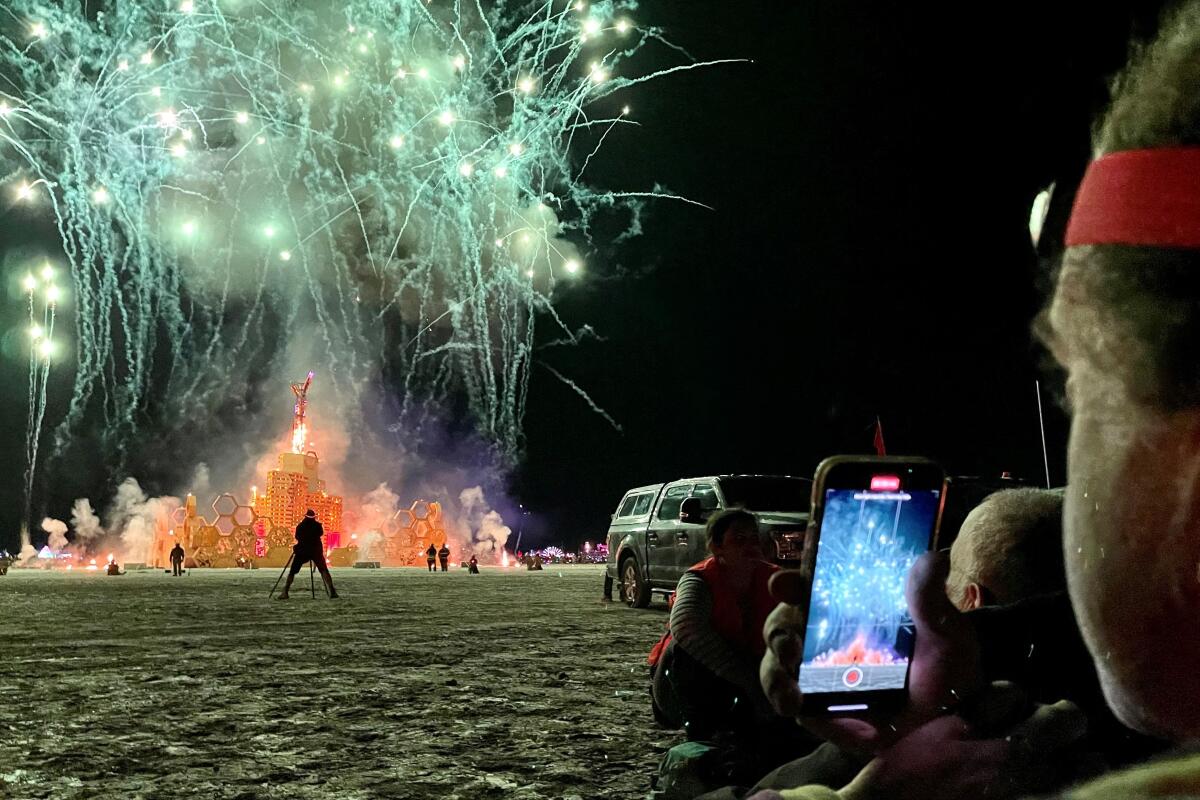
Price and about 25 others in his camp remained in Black Rock City on Tuesday to see the “Temple Burn,” a more somber closing ceremony that follows the climactic “Man Burn.”
Price said he was frustrated with the “sensationalized” media reports about the conditions at the event. Some inexperienced Burners panicked and tried to flee, got stuck in the mud and had to come back, he said. Others deserted their vehicles and left piles of stuff behind, making it difficult for the restoration crew to clean the MOOP, or “matter out of place” — central to Burning Man’s principle of leaving no trace.
“It’ll be harder because of the mud, and our footprints leave dimples,” Price said. “If it’s not 100% cleaned up this year, we’ll recover anything that went missing or got buried in the mud. I’m confident it’ll remain pristine.”
Climate and anti-capitalist activists blocked a road leading to Burning Man, creating gridlock and leading to clashes with motorists and tribal rangers.
Allen, the Pershing County sheriff, told the San Francisco Chronicle in an email that angry, frustrated attendees leaving Monday were “not showing compassion to their fellow man who have endured the same issues over the past few days.”
“As usually happens in what burners refer to as the ‘default world’ people allow their emotions to override their reasonableness and they are lashing out at each other as they leave the playa and attempt to make it to their next destination,” Allen told the Chronicle. “This behavior definitely does not fall within the 10 principles of Burning Man, but that is not the fault of [the Burning Man Project] either, but is a societal issue.”
Many Burners said that although there might have been cases of such interactions, they were almost certain to be the minority.
Allen did not immediately respond to requests from The Times for comment.
Despite the adverse weather setting back the burning of the Man effigy by two days, it finally happened on Monday night.
“It was the best burn by far,” Price said. “The fireworks were spectacular and blew everybody away. We’ve never seen such a display ever.”
More to Read
Sign up for Essential California
The most important California stories and recommendations in your inbox every morning.
You may occasionally receive promotional content from the Los Angeles Times.
